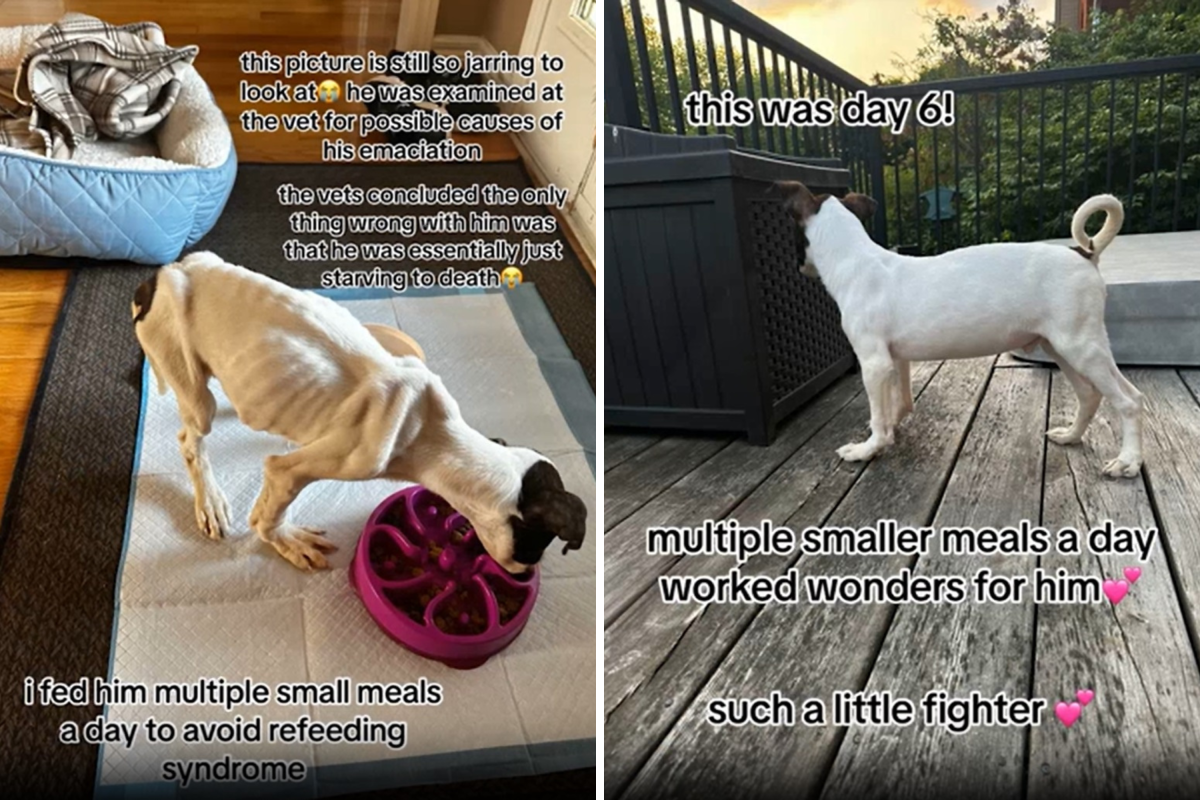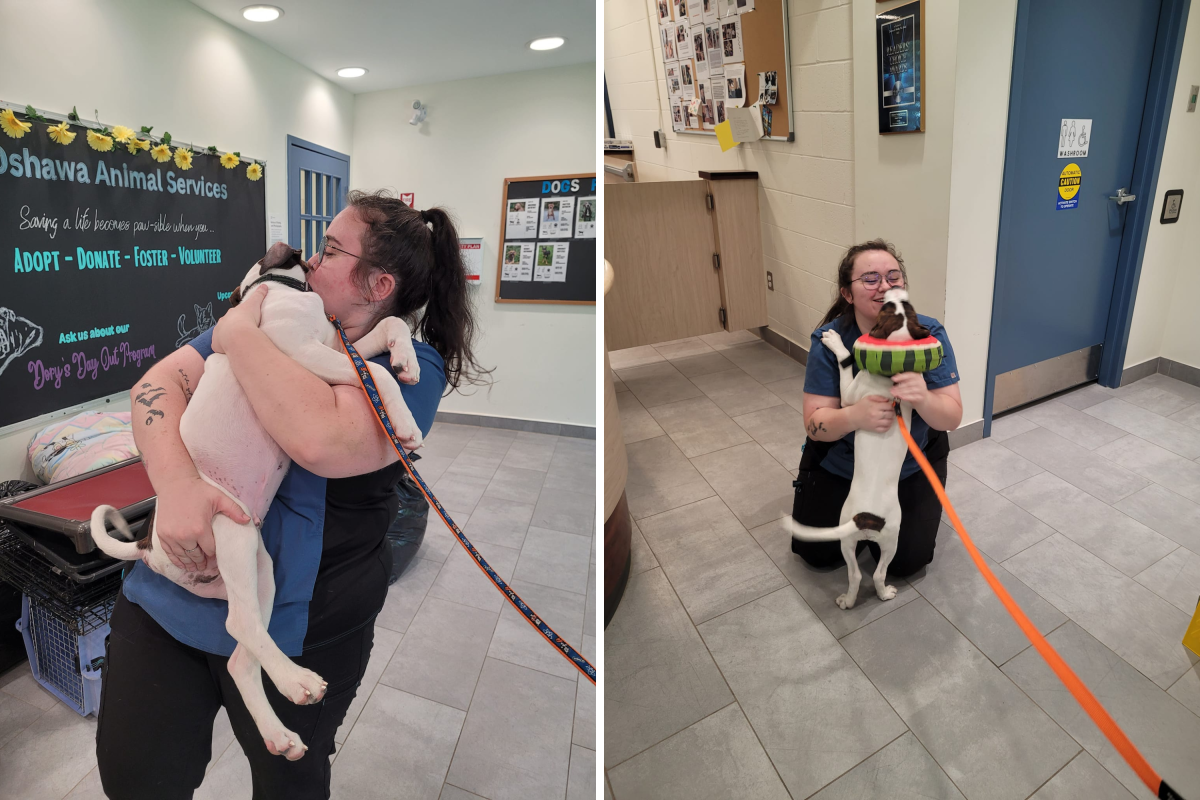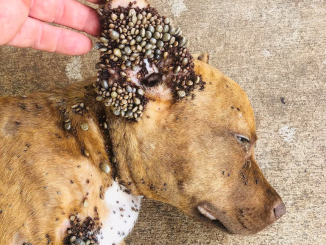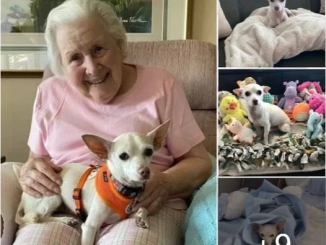
It may be hard to watch this viral video that shows the harsh reality of animal neglect. Harold was skin and bone when he was found wandering the streets in North Oshawa in Ontario, Canada. But now is thriving and just like any other puppy—thanks to his foster carer.
Kayleigh McGovern, a volunteer and team member at Oshawa Animal Services, decided to look after the emaciated dog who was too weak to even walk back in July. She documented his progress and shared a slideshow of images on her TikTok page.
Kathy Pittman-Feltham, the shelter manager told Newsweek: “Harold quickly captured all of our hearts and we were rooting for him to get healthy and find his forever home.”

In the viral video that has 791,800 views, @kayleigh_mcgovern added on-screen text to explain each image. She stated he spent the first three days in bed and he didn’t have the strength to empty his bladder.
She wrote: “We shared many cuddles, watched lots of shows, and most importantly he got lots of rest.”
One image shows Harold’s skeletal body as the on-screen text explains: “This picture is still so jarring to look at. He was examined at the vet for possible causes of his emaciation. The vets concluded the only thing wrong with him was that he was essentially starving to death.”
After a few days of tender love and care, Harold started to feel stronger and became playful. Now four months on, he is just like any other puppy.
Pittman-Feltham told Newsweek: “Kayleigh helped nurse him back to health and he was then adopted by a member of the community who is a second-time adopter from us.
“He is doing phenomenal and is the perfect picture of health.”
Harold’s remarkable transformation has touched the hearts of thousands of TikTok users. But sadly, his situation wasn’t a rare case.

Each year 6.3 million pets are surrendered to U.S. shelters, which is an average of 17,260 a day, according to the American Society for the Prevention of Cruelty to Animals.
Around 920,000 surrendered animals are euthanized every year. Shelters are striving to minimize euthanasia rates by promoting adoption campaigns, spaying and neutering programs, and behavior rehabilitation.
Pittman-Feltham told Newsweek: “We see many sad cases come through our doors and the team is always excited to be a part of the next chapter in their story as most times we don’t have any information on their past.
“We are hoping Harold’s story shines a light on the many cases across the rescue world that need our help.

“Fostering saves lives and Harold is a perfect example of that!“
“After 15 Years, Dog’s Tearful Birthday Celebration with First-Ever Cake”
Amidst the charming locality where cheerfulness reverberated in every nook and cranny, a delightful event was taking place. A furry companion, who had been waiting for this moment for 15 years, was finally getting to relish the enchantment of a birthday gala – complete with a cake decked with twinkling candles.

At the appointed hour, a group of loved ones had gathered around in eager anticipation to witness a momentous event. At the center of attention was a faithful dog whose eyes shone with excitement and curiosity. The atmosphere was electric as everyone joined in singing the classic song of “Happy Birthday.”
The dog seemed to sense the importance of the occasion and responded with a contagious wag of its tail. The room was filled with an undeniable sense of happiness as the cake, complete with decorations suitable for dogs, made its way to the center of the gathering. Excitement reached its peak as the birthday girl blew out the candles, signaling the beginning of a new phase in her life. Love overflowed from every corner of the room.

But it wasn’t just the flickering candles that caught everyone’s attention. It was also the unexpected sight of a solitary tear rolling down the furry cheek of the dog. The room fell into a hushed silence as the observers exchanged glances filled with a mix of surprise and tenderness. This tear was a silent testimony to the years of unconditional loyalty and the simple desire for a moment of celebration, conveying a heartfelt message.
As the birthday cake was presented to the dog, the room erupted in cheers and applause. The dog, now surrounded by its loved ones, cautiously sniffed the cake before taking a tentative bite. The taste of the special treat seemed to transport the canine companion to a world of ecstasy, and in that magical moment, all the waiting became irrelevant.

The birthday festivities continued well into the evening, with plenty of merriment, amusing anecdotes, and the delightful sound of a dog’s happy barks. This was no ordinary party; it was a touching tribute to the passing of time and the unbridled joy that our furry friends bring into our lives. The celebration was a testament to patience, love, and the power of long-awaited reunions.
As the night wound down, the dog snuggled up in a cozy bed surrounded by the remnants of a joyous occasion. The earlier tears had melted away, replaced by the radiant glow of contentment shining from the canine’s eyes. It was an unforgettable gathering that would be treasured by all who were present, serving as a reminder that our loyal companions deserve their moment in the spotlight, regardless of how long it takes to arrive.



Leave a Reply